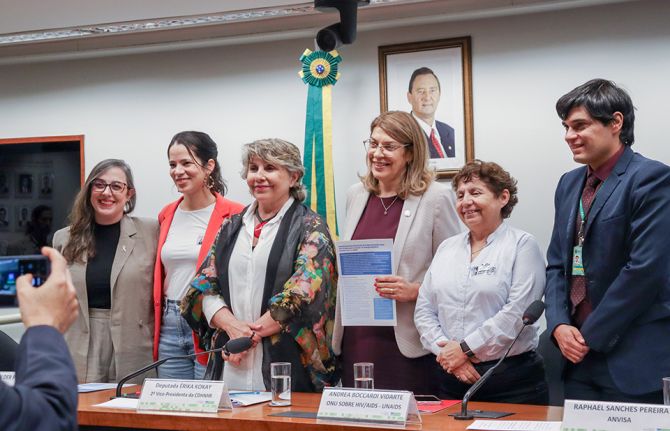

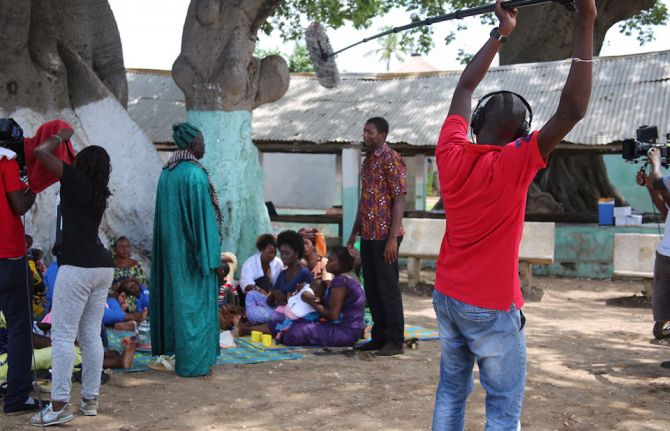
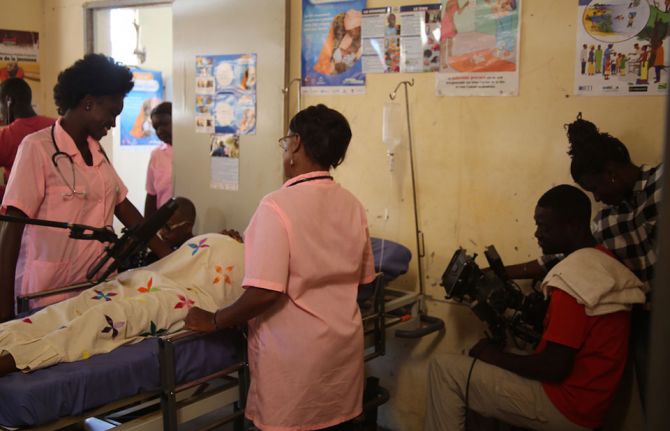
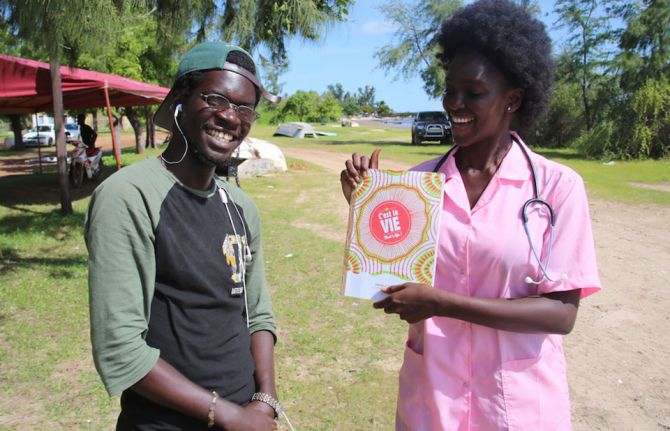
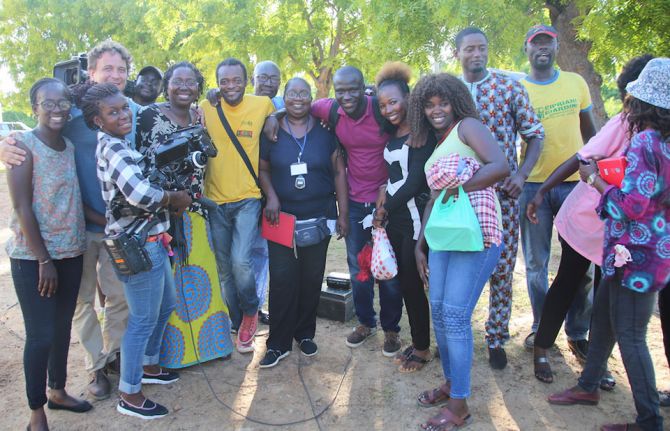
Feature Story
The power of television to educate and entertain millions in western Africa
07 February 2018
07 February 2018 07 February 2018A baby abandoned at a health clinic, an abusive boyfriend, dating woes and fake medicines are all plot twists in C’est la Vie (That’s Life), a television series based in, and produced in, Africa. Shot in Senegal, the sitcom takes place in the fictitious Ratanga health clinic, where midwives interact with patients and work on various cases. Their life stories and office politics come into play, adding intrigue, but the overall aim is to raise health awareness through entertainment.
The series, a first in western Africa, was inspired by Mexican pioneer Miguel Sabido—who used telenovelas to promote literacy and family planning—as well as by the educational television series Shuga. Shuga, the MTV English-language series, is now in its six season and has been so successful that it has moved its filming location from Kenya to capture new stories from Nigeria and South Africa.
Réseau Africain d’Education en Santé (RAES), a nongovernmental organization backed by several United Nations agencies and the French Government, founded Keewu, a production company, to launch the show.
RAES founding member and now Keewu producer Alexandre Rideau’s motivation for launching C’est la Vie was to reach millions via television. “The statistics speak for themselves in western Africa,” Mr Rideau said. “Young people are clueless about sexuality, HIV prevention and simple things like menstruation.” He also added that it was obvious from the many questions received that people had real difficulty in accessing information.
The show highlights many of the realities of the region, from high levels of maternal deaths to HIV infection. Four in five children living with HIV in western and central Africa are still not receiving life-saving antiretroviral therapy and AIDS-related deaths among adolescents aged 15–19 years are on the rise in the region, according to a UNAIDS/United Nations Children’s Fund report, Step up the pace.
In its second season, C’est la Vie has gained in popularity, so much so that actors are being recognized in the street. Mr Rideau recounted that a toll collector in a toll booth in Dakar would not let an actress who plays an unpleasant character in the series go through in her car.
Broadcast in western and central African countries on A+ and TV5 Monde Afrique, as well as local channels, the show reaches about 100 million viewers. Mr Rideau explained that the series may not necessarily change people’s behaviour, but it gets crucial conversations started about health issues. In Senegal and Togo, open debates about the show’s themes take place in town squares following an airing.
Mr Rideau said that he wants to roll the show out in six other countries in 2018. A radio spinoff in the Hausa language is now being distributed in Niger.
PROMO REEL - C'est la vie! - Saison 1 from Keewu Production on Vimeo.
Region/country
Related



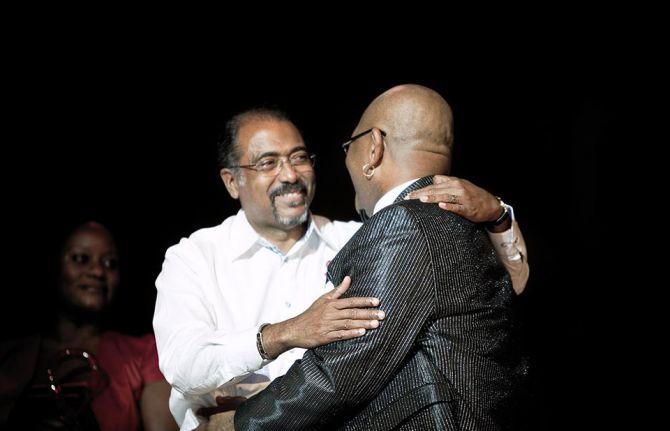
Feature Story
UNAIDS mourns the death of Jimmie Earl Perry
12 January 2018
12 January 2018 12 January 2018Jimmie Earl Perry, the first UNAIDS National Goodwill Ambassador for South Africa, has died.
A seasoned singer and performer in theatre productions around the world, Mr Perry was notable for his work in using the creative arts to educate audiences. At the Africa Centre of HIV/AIDS Management at Stellenbosch University, South Africa, he staged HIV educational theatre productions that were performed to more than 3 million people in communities and workplaces nationally and internationally.
At the time of his appointment as UNAIDS National Goodwill Ambassador, Mr Perry said, “If we are to turn this epidemic around, South Africans have to really understand what the virus is, how it is spread, that it is not a death sentence thanks to medical treatment and to put an end to the fear and stigma of living with HIV.”
Michel Sidibé, UNAIDS Executive Director, said Mr Perry’s appointment in 2009 came at a critical time for the AIDS response in South Africa, with far-reaching policy changes announced by the President of South Africa, Jacob Zuma, on World AIDS Day of that year. “I decided to appoint Jimmie Earl Perry as National Goodwill Ambassador because of his capacity to inspire and his willingness to lead and empower others. He had a strong belief in the potential of people to rise above their circumstances and he encouraged the best in everybody he met.”
Mr Sidibé said Mr Perry’s passing was a great loss for the AIDS community. “Jimmie Earl Perry encouraged and inspired my global advocacy and efforts to end the AIDS epidemic as a public health threat by 2030. UNAIDS benefited a great deal from our association with Mr Perry, and we are grateful for his service and dedication. I am humbled and privileged to have counted him as my friend and brother,” he said.
Region/country

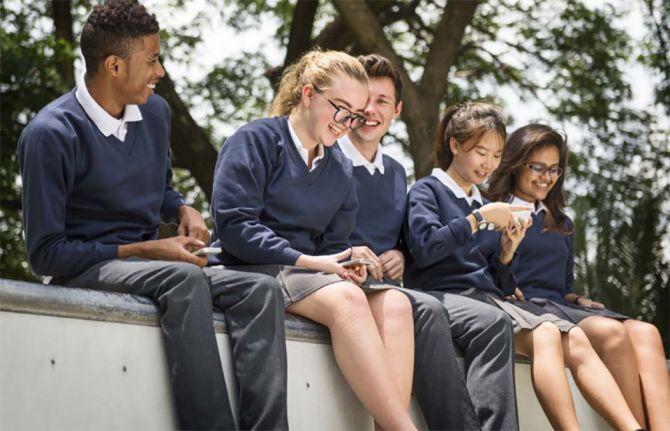
Feature Story
UN urges comprehensive approach to sexuality education
10 January 2018
10 January 2018 10 January 2018Close to 10 years after its first edition, a fully updated International Technical Guidance on Sexuality Education published today by UNESCO advocates quality comprehensive sexuality education to promote health and well-being, respect for human rights and gender equality, and empowers children and young people to lead healthy, safe and productive lives.
“Based on the latest scientific evidence, the International Technical Guidance on Sexuality Education reaffirms the position of sexuality education within a framework of human rights and gender equality,” says UNESCO Director-General Audrey Azoulay. “It promotes structured learning about sexuality and relationships in a manner that is positive and centred on the best interest of the young person. By outlining the essential components of effective sexuality education programmes, the Guidance enables national authorities to design comprehensive curricula that will have a positive impact on young people’s health and well-being.”
The Technical Guidance is designed to assist education policy makers in all countries design accurate and age-appropriate curricula for children and young people aged 5 – 18+.
Based on a review of the current status of sexuality education around the world and drawing on best practices in the various regions, the Guidance notably demonstrates that sexuality education:
- helps young people become more responsible in their attitude and behaviour regarding sexual and reproductive health
- is essential to combat the school dropout of girls due to early or forced marriage, teenage pregnancy and sexual and reproductive health issues
- is necessary because in some parts of the world, two out of three girls reported having no idea of what was happening to them when they began menstruating and pregnancy and childbirth complications are the second cause of death among 15 to 19-year olds
- does not increase sexual activity, sexual risk-taking behaviour, or STI/HIV infection rates. It also presents evidence showing that abstinence-only programmes fail to prevent early sexual initiation, or reduce the frequency of sex and number of partners among the young.
The publication identifies an urgent need for quality comprehensive sexuality education to:
- provide information and guidance to young people about the transition from childhood to adulthood and the physical, social and emotional challenges they face.
- tackle the challenges posed by sexual and reproductive health issues, which are particularly difficult during puberty, including access to contraception, early pregnancy, gender-based violence, sexually transmitted infections (STIs) and HIV and AIDS
- raise awareness of HIV prevention and transmission, of which only 34 per cent of young people around the world can demonstrate accurate knowledge
- complement or counter the large body of material of variable quality that young people find on the internet, and help them face increasingly common instances of cyberbullying.
The Guidance was produced in collaboration with UNAIDS, United Nations Population Fund (UNFPA), United Nations Children’s Fund (UNICEF), UN Women, and the World Health Organization (WHO).
UNAIDS Cosponsors
Related
 “Who will protect our young people?”
“Who will protect our young people?”

02 June 2025

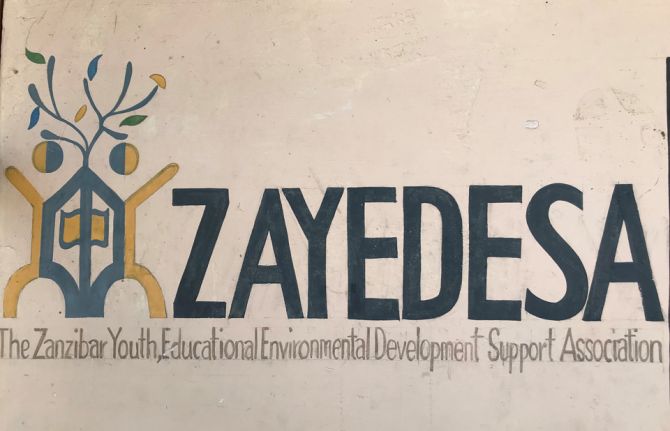
Feature Story
Turning community action into results
15 December 2017
15 December 2017 15 December 2017Aisha Abdallah never misses her regular medical appointments at the Zanzibar Youth Education, Environment, Development Support Association (ZAYEDESA) care and treatment centre for HIV, located on the outskirts of Stone Town, Zanzibar.
She was diagnosed with HIV in 2006. “I went with a group of friends to get tested. I was keen to know my status because of my lifestyle. And I tested HIV-positive,” she says.
Ms Abdallah is engaged in sex work. “I was in a steady relationship with the father of my daughter,” she says. “But when he started to mistreat me, I had to run away from the Tanzania mainland to Zanzibar and find a way of living alone.” She says she often cries at the thought of leaving her daughter behind.
ZAYEDESA runs the only community-based HIV clinic in Zanzibar. Ms Abdallah found out about the new clinic in 2014 from a community outreach worker and a former sex worker. “In the first care and treatment centre where I used to go, I was treated like a kid and not getting the services which I needed. At ZAYEDESA, health-care workers talk to me in a friendly manner and understand my concerns,” she says. At the centre, she has also benefited from tuberculosis screening and treatment and family planning services, including condoms. “I trust the clinic. I know if I get ill I can get good service there.”
ZAYEDESA has established four youth-friendly health centres on both islands of Zanzibar, Unguja and Pemba, an anonymous toll-free AIDS helpline and a text message service to deliver HIV and sexual and reproductive health information. It is at the centre of the community-based AIDS response in Zanzibar and plays a critical role in offering stigma and discrimination-free services to key and vulnerable populations.
Stigma remains one of the major obstacles to accessing prevention, treatment and care services in Zanzibar. Ms Abdallah would like to pass on one message, “I want people to understand that HIV can affect anyone, anywhere.”
Ms Abdallah, who prefers not to use her real name, is on life-saving HIV treatment. “I know the importance of adhering to my antiretroviral treatment. My mum is very supportive, she calls me every day to check on me and remind me about the medicines.”
UNAIDS has supported the refurbishing of youth-friendly centres managed by ZAYEDESA. Currently, UNAIDS provides support to ZAYEDESA to ensure its meaningful participation in the development, implementation and review of the United Nations Joint HIV Plan in Zanzibar and on supporting its resource mobilization efforts.
Region/country
Related

Feature Story
A fearless voice for adolescents living with HIV
13 December 2017
13 December 2017 13 December 2017Suhaila Msham Mwarimwana is 19 years old and lives in Zanzibar City. She was born with HIV and lost both parents before she was nine. But, despite the difficulties she faces, she is an inspiration for other adolescents and children living with HIV.
“When I was about 12, I overheard neighbours saying I was HIV-positive. So I asked my oldest sister and she told me I had a bone-related disease,” she says. “But I sensed this was not the truth, so after some time I insisted and she took me to the Zanzibar Association of People Living with HIV/AIDS and I discovered my HIV status.”
Ms Msham Mwarimwana says her first thought was for her youngest brother, who also tested HIV-positive. She felt hopeless and desperate. “I thought HIV was a death sentence,” she says.
At a Zanzibar Association of People Living with HIV/AIDS (ZAPHA+) children’s club, Ms Msham Mwarimwana was given information and advice on how to live positively with HIV. She started HIV treatment and has stuck to the regime since, despite a lack of adequate nutrition, which she says makes adherence difficult.
After she finished secondary school she began volunteering for ZAPHA+. She facilitates clubs for children and adolescents. “We exchange ideas, share our challenges and advise one another,” she says. Her only wish is that the club had more space and was able to provide refreshments, particularly for the younger children. “We stay there and talk for a long time!” she says.
She is also a member of the Young Reporter Network, a national consortium of community-based children’s radio projects that reaches millions of listeners. She and other young reporters produce a 30-minute programme each fortnight, using audio diaries, commentaries and interviews to share their stories.
Ms Msham Mwarimwana has big dreams and plans to study journalism. She is proud of her contribution to the AIDS response in her country. “My role towards getting to zero—zero new HIV infections, zero discrimination and zero AIDS-related deaths—is to get my story heard to confront stigma and discrimination and draw attention to community issues that affect children and youth,” she says.
Looking back, Ms Msham Mwarimwana says she would have liked her parents to tell her she was HIV-positive. She says it is very important for children to know their HIV status. “I could have started my treatment even earlier,” she says. “Parents of HIV-positive children need to educate society that HIV can affect anyone and there is no shame.”
She believes that AIDS-related illnesses are a leading cause of death among adolescents in eastern and southern Africa because many adolescents are unaware of their HIV status and do not know that there are life-saving treatment and support structures available to them. “ZAPHA+ is my second home,” she says. “I am so thankful for the support I have received there.”
She has a simple message for her peers. “Accept and be open about your HIV status, be confident and believe in yourself.”
UNAIDS has been supporting ZAPHA+ since its establishment through financial and technical support. UNAIDS supports the ZAPHA+ Secretariat to coordinate its activities in the 10 district clusters to ensure meaningful participation of ZAPHA+ in the development, implementation and review of the United Nations Joint HIV Plan in Zanzibar. UNAIDS also supports its resource mobilization efforts. Other United Nations agencies are closely engaged, in particular the United Nations Children’s Fund.
Region/country
Related

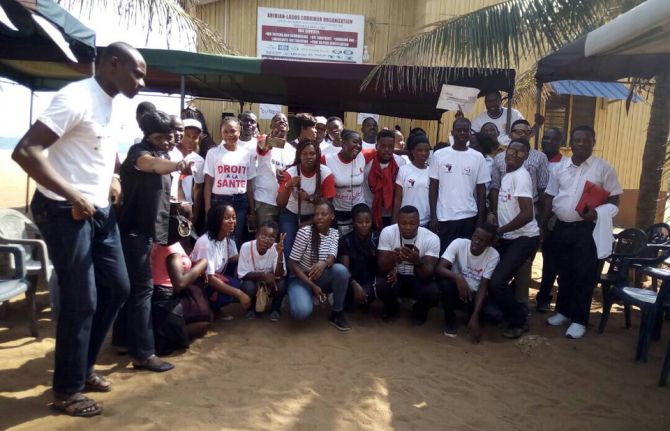
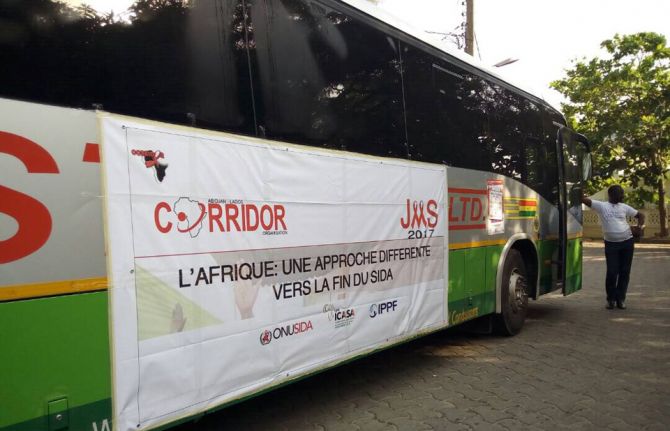
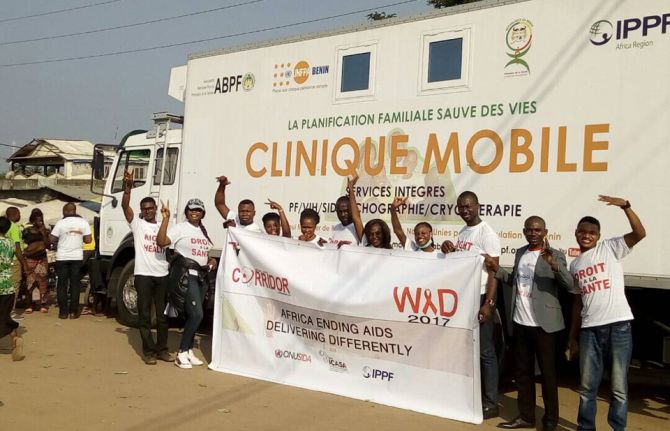
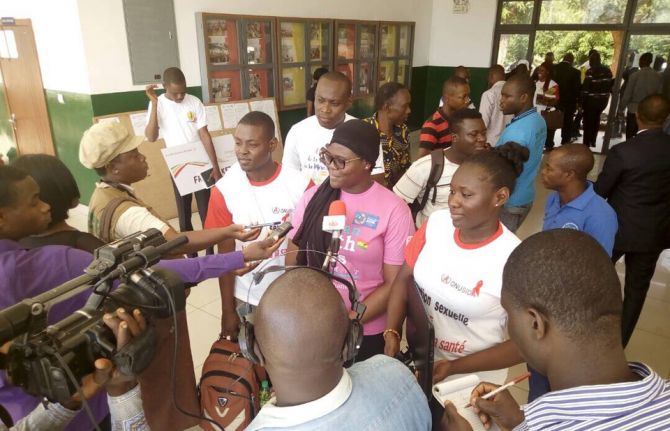
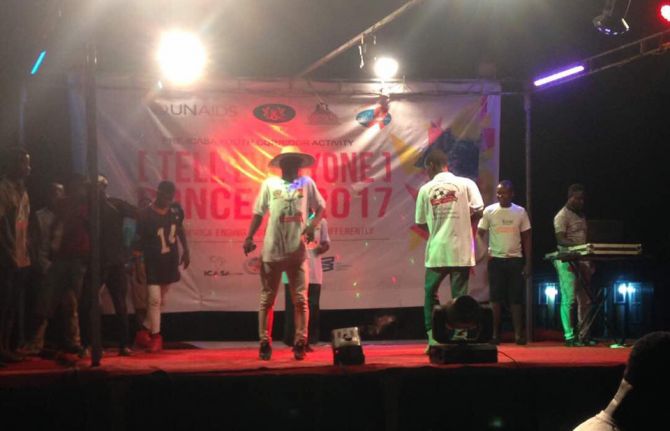
Feature Story
Youth on HIV awareness tour travel 1000 kilometres to ICASA
07 December 2017
07 December 2017 07 December 2017The young people spilled out of the bus, happy to have reached Côte d’Ivoire. Not only could they stretch their legs following the last leg of their journey, but they had arrived at their final destination, the International Conference on AIDS and STIs in Africa (ICASA). The Youth Caravan had started with 10 young people in Nigeria, followed by 10 more joining in Benin and a further two stops in Togo and Ghana.
Along the three-day, 1000 km, trip more than 40 young people shared their stories and experiences and talked about HIV, stigma and empowerment of young people in cities along their route.
One of the participants, Jefferson Kudolo from Ghana, couldn’t believe how fun the trip was, despite the distance, “The travelling brought us closer together and we forgot the kilometres,” he said. Another participant, Dayo Sunday from Nigeria, agreed. He loved connecting with people with similar tales from other countries.
Each day, the Youth Caravan led or attended an event, which included screenings of HIV-related films, meeting the First Lady of Benin, debates and an international dance competition.
Mr Sunday said music and dancing not only got the group to unwind, it allowed them to interact with other young people along the way. A peer educator at the Nigerian Teens and Kids nongovernmental organization, he said, “Dancing is one of the best tools to attract people who may be too shy to come to HIV-related events.”
“I know what works, and music definitely works,” Mr Kudolo said, explaining how he and the other participants of the Youth Caravan would distribute condoms and lots of practical advice at the venues. UNAIDS and partners started recruiting participants for the Youth Caravan nearly a year ago.
Kodo Ngabane, UNAIDS Youth and Social Organization Officer for the western and central African region, beamed with pride as the bus pulled into Abidjan. “We constantly say that young people need to be involved, and here is a clear example of doing just that,” he said. “We listened to them and they were in the driver's seat.” Without missing a beat, he added, “Figuratively, not actually driving the bus.”
Eric Gunn, accompanying youth participants from an association of girls in Togo, Action de Soutien au Developpement et l’Education de la Jeune Fille, said he was touched to see such enthusiasm. “A real esprit de corps took hold regardless of country, language, gender, sexual orientation,” he said. “Even us elders joined in the fun and were bombarded with questions.”
The Youth Caravan was welcomed at the ICASA Community Village by the Côte d’Ivoire Minister of Health, Raymonde Goudou-Coffie, King Oyo from Uganda, UNAIDS Executive Director Michel Sidibé and others.
After a standing ovation and lengthy clapping for the participants, Mr Sidibé addressed the crowd. “We count on you! You are not the leaders of tomorrow, but the leaders of today,” he said. “We will not end AIDS without young people.”
Related information
Related
 “Who will protect our young people?”
“Who will protect our young people?”

02 June 2025

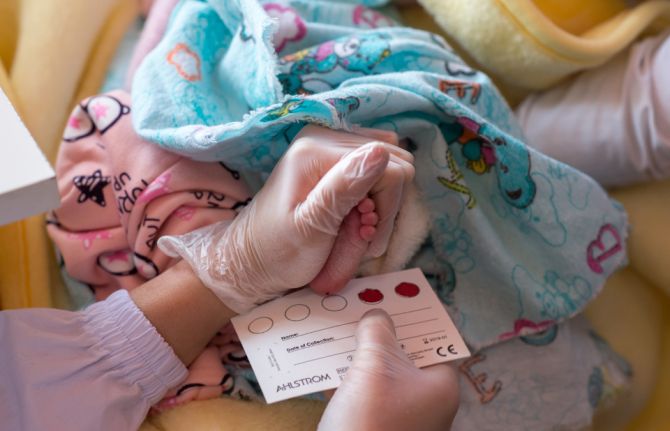
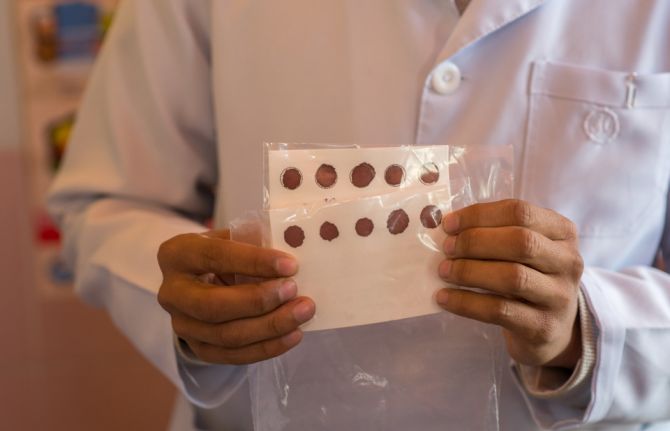
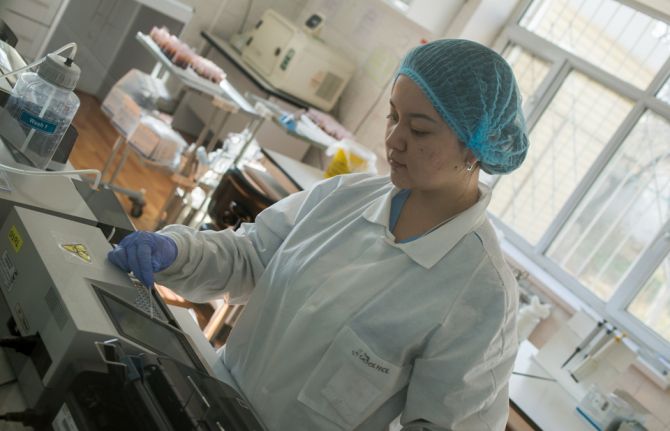
Feature Story
Early infant diagnosis of HIV: changing lives for mothers and infants
07 December 2017
07 December 2017 07 December 2017Mahabad Asanova’s first daughter was found to be living with HIV after being rushed to hospital with a high fever. For her second pregnancy, Ms Asanova had to wait 18 months before finding out that her son was HIV-negative.
By the time of her third pregnancy, however, things had changed dramatically. Within a month of her birth, Ms Asanova had been told that her daughter was HIV-negative. A revolutionary method of HIV testing of infants, dried blood spot (DBS) testing, had by then been introduced, significantly cutting the time for diagnosis.
“Waiting 18 months to know about the HIV status of my child was terrible,” Ms Asanova said. “I’m so relieved—dried blood spot testing completely changed my life.” Before DBS, children had to wait a year or more to be tested.
DBS is simple: no sophisticated equipment or invasive testing methods are needed. After a prick on the newborn’s heel, a drop of blood is collected on filter paper and dried. The sample is sent to a laboratory for testing and the results are known before the infant is a month old, allowing infants living with HIV to be treated immediately with life-saving antiretroviral medicines.
“Before dried blood spot testing was widely introduced in 2013 in Kyrgyzstan, only around 15% of infants were diagnosed early,” said Edil Tilekov, HIV Programme Officer for the United Nations Children’s Fund (UNICEF). “In 2017, that figure grew to nearly 90%.”
Today, HIV science and diagnostics are becoming ever-more sophisticated. UNICEF is promoting point-of-care HIV diagnostic methods for infants that would yield an HIV diagnosis a mere two hours after collecting blood.
The introduction of DBS and improved training for doctors has helped to defuse some of the stigma against people living with HIV.
“Stigma among medical staff began to decrease as antiretroviral medicines were integrated into the primary health-care system,” Elmira Narmatova, Director of the Osh Oblast AIDS Centre, said. “It became more like a chronic disease, mortality declined.”
Children who are treated early fare better and the more the medicines work, the more confident parents become. Today, in part as a result of DBS, more than 95% of children living with HIV in Osh, Kyrgyzstan, access antiretroviral therapy.
Yet pockets of resistance remain. Despite early diagnosis, not all infants receive the medicines they need. “We are interviewing parents and medical staff to find out why some parents still don’t want to give their infants antiretroviral medicines,” said Mr Tilekov.
Informal conversations already provide clues: resistance may be due to religion, to scepticism about immunization or even to urban myths.
“Although much has been done to provide parents with information and train medical staff, there is still a lack of resources and trained personnel, so some parents will slip through the net and might not be briefed properly about side-effects,” said Mr Tilekov. “So, if their infants lose weight or don’t eat well after starting antiretroviral therapy, parents blame the medicines.”
When an infant or mother is tested for HIV in Osh, the laboratory sends the results to the Osh AIDS Centre, a pleasant house set among trees in a leafy suburb, its gates open in welcome. The hallways are decorated with images of the popular Vitaminka fairy tale, a comic strip that helps health workers and parents explain to children the importance of taking their antiretroviral medicines regularly.
By providing child-friendly spaces and psychosocial support in addition to medical treatment, the centre makes parents feel welcome and encourages them to visit, pick up prescribed medication and get tested regularly.
The centre, upgraded by the Ministry of Health together with UNICEF and UNAIDS with support from the Government of the Russian Federation, now treats more than 200 children and a psychologist provides psychosocial support to children living with HIV.
Away from social pressures and among friends, parents can exchange hopes for the future and find much needed support at the centre.
Ms Asanova looks relaxed as her fingertips touch across her lap, her olive-green dress contrasting with her cream-coloured hijab. Mahabad Asanova isn’t her real name, since she still worries about stigma and discrimination beyond the centre’s walls. But she isn’t afraid anymore, even though she is now expecting another child. Whatever happens, thanks to DBS, she will no longer face painful months of waiting for a diagnosis.
Region/country
Related

Feature Story
In Mozambique, five adolescent and young girls receive a special award on World AIDS Day for winning the SMS BIZ/U-Report Girl-to-Girl competition
06 December 2017
06 December 2017 06 December 2017This story was originally published by UNICEF
In Mozambique there has been some progress in the fight against AIDS, notably in preventing mother to child transmission of HIV. But progress in preventing new HIV infections among adolescents (10-19) and improving testing and treatment in adolescent populations are still unacceptably slow.
Around 120,000 adolescents live with HIV (UNAIDS 2017). The data also reveals a worrying gender disparity: according to IMASIDA 2015, HIV prevalence among adolescent girls 15-19 is four times higher than for boys (6.5% vs 1.5%). Prevalence is also higher in urban areas than in rural. Young women have higher odds of HIV infection due to various factors including gender norms, reduced access to information, and age-disparate sex. Additionally, not knowing one’s HIV status and engaging in high risk practices predisposes young people to the risk of contracting HIV. This highlights the need for adolescents and young people to have access to appropriate information as they explore their sexuality.
The AIDS epidemic must remain a global public health concern, according to UNICEF and UNAIDS. Innovative solutions must be adopted to speed up progress in preventing HIV infection of children and adolescents and ensuring those living with HIV get the treatment they need.
In 2015, in the context of the youth-focused Sexual and Reproductive Health (SRH) and HIV prevention Geração Biz (Busy Generation) programme, UNICEF Mozambique partnered with line ministries of Youth and Sports; Health; Education and Human Development; UNFPA and the youth association Coalizão (Youth Coalition) to adapt the SMS-based technology for development platform U-Report and roll out the programme known as SMS BIZ. This was aimed at improving adolescent and young people’s access to comprehensive and personalised SRH and HIV information through SMS (for more information visit http://mozambique.ureport.in/).
SMS BIZ partners set up a counselling hub managed by Coalizão with 24 trained peer counsellors, equipped with ICT facilities and a reference guide on SRH, HIV and Gender-based Violence (GBV) prevention to facilitate their capability to respond to adolescents queries. The counseling service is totally anonymous so neither the counsellors nor users can identify the other. Counsellors respond to about 1,000 questions daily. A total of 350,000 questions were responded to date. Communication and promotion materials were developed to promote the counselling service while advocacy sessions were held in selected provinces in order to create synergies with different stakeholders. Partnerships with the three Telecom Operators allowed SMS BIZ partners to count on free un-limited SMS for the period of 2017-2020.
In only two years, SMS BIZ/U-Report, has exceeded expectations with over 110,000 active adolescents and youth registered by September 2017, using the services for information on topics relevant to them.
Adolescents and young people registered have been engaged in discussions addressing misconceptions about SRH, HIV prevention and treatment, and increasing uptake and linkages to HIV and GBV services. Results from a poll show positive results, with 65% of adolescents and young people that responded to the poll were referred and adhered to health facilities during the counselling session for additional individual face-to-face counselling, consultation or treatment.
However, until recently, the challenge has been attracting as many girls as boys to the platform with a ratio of 60% boys - 40% girls. Raima Francisco Manjate, one of the SMS BIZ/U-Report stellar peer counsellors officially launched the Girl-to-Girl invite system on the International Day of the Girl Child on October 11th, with an intervention at the National Girls Conference organized in the context of the UN Joint programme Action for Girls, funded by the Swedish Government. The results have been outstanding: in 72 hours, more than 8,600 girls were successfully registered, the girls' user population grew from 4% to 44%, with five girls registering more than 50 friends and winning the competition.
Today, the total number of SMS BIZ/U-Report users reached 130,000.
The five adolescent and young girls, winners of the competition, have been awarded today at the World AIDS Day Celebrations, in Maputo and in the provincial capitals of Quelimane, Nampula and Beira in recognition of their efforts in mobilising friends to adhere to this important counselling service.
Neima Muianga, 20 years old and Cristina Djive, 18 years old, both from the capital Maputo, were the two girls awarded today at the WAD ceremony, by the following high-level dignitaries such as Mr. Carlos Agostinho do Rosario, Mozambique Prime Minister, Mr. Luiz Loures, UNAIDS Deputy Executive Director, Ms. Nazira Abdul, Health Minister and Ms. Clarisse Machanguana, UNICEF National Ambassador.
Neima was thrilled when she discovered she had won the competition: “I feel happy about it. I have sent various SMS to contact numbers on my list, my neighbours, church members and even girls or young women I would bump into in the streets. SMS BIZ is very important for us. I don’t feel comfortable speaking with my parents about sexuality as this is taboo in Mozambique”.
"It is an excellent example of how young people can empower each other through technologies and innovative projects. Girl-to-Girl (G2G) is the kind of innovation that has an essential role for gender equality and health as we work to leave no one behind in implementing the sustainable development goals," said Luiz Loures, UNAIDS Deputy Executive Director, Assistant Secretary-General of the United Nations.
Now that the SMS BIZ/U-Report initiative has been scaled up at national level, SMS BIZ partners expect to reach and engage approximately 400,000 adolescents and young people by 2020. According to Cristina “this initiative cannot stop. So far, it has been a great experience for us.”
Region/country

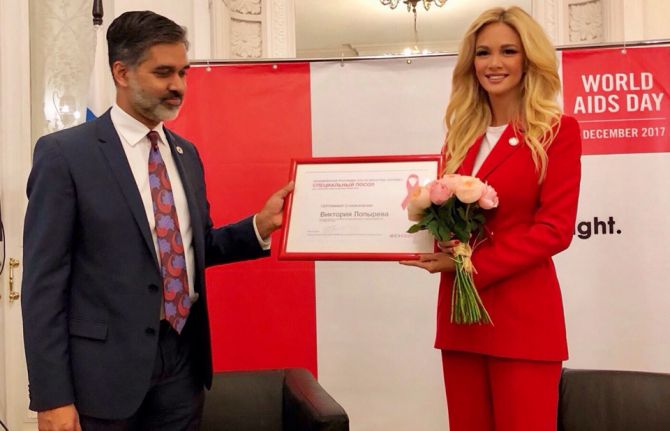
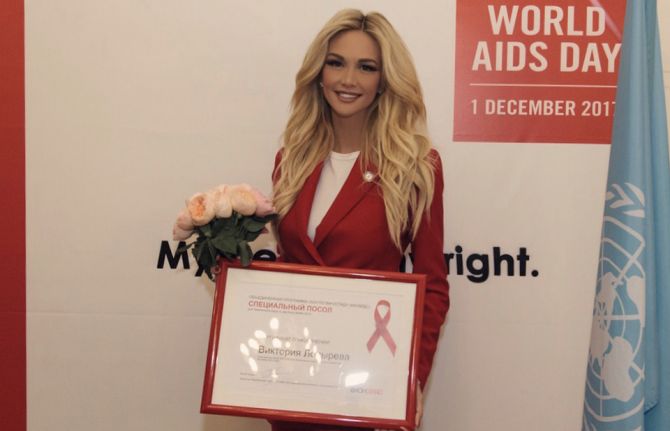
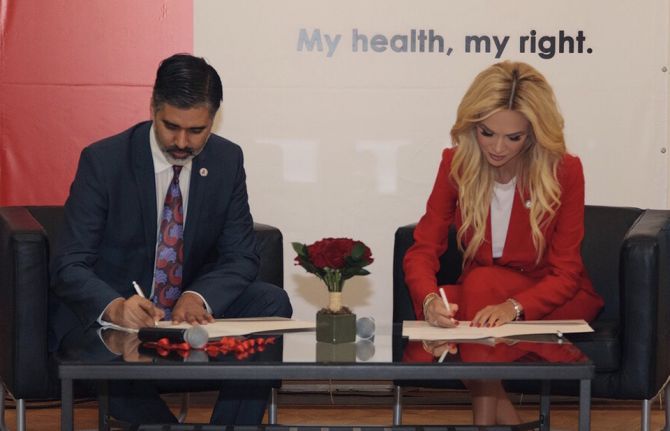
Feature Story
Victoria Lopyreva appointed as a UNAIDS Special Ambassador for the 2018 FIFA World Cup
30 November 2017
30 November 2017 30 November 2017Victoria Lopyreva has been appointed as a UNAIDS Special Ambassador, tasked with highlighting HIV awareness and promoting zero discrimination during the 2018 FIFA World Cup, which will be held in the Russian Federation. The announcement was made by UNAIDS in Moscow, Russian Federation, on the eve of World AIDS Day and the final draw for the 2018 FIFA World Cup at the State Kremlin Palace.
“In her new capacity as a UNAIDS Special Ambassador, Victoria Lopyreva will highlight HIV awareness and prevention during the 2018 FIFA World Cup. She will encourage millions of people coming to the World Cup to protect themselves from HIV and champion zero discrimination on the basis of race, nationality or HIV status,” said Vinay P. Saldanha, Director for the UNAIDS Regional Support Team for Eastern Europe and Central Asia.
“It is my pleasure to accept the role as UNAIDS Special Ambassador for the 2018 FIFA World Cup,” said Ms Lopyreva. “Football is a unique global phenomenon, uniting players, teams and fans from different countries, nationalities and ages. The 2018 FIFA World Cup is a unique opportunity to promote another amazing goal—to unite a winning team to end the AIDS epidemic and reach zero discrimination.”
"I appreciate and value every day Victoria Lopyreva's commitment as FIFA World Cup 2018 Ambassador in Russia. Her passion, her dedication and her energy will definitely help raise awareness on HIV and AIDS in and outside Russia. Victoria's contribution to fighting all forms of discrimination in and off the pitch is something that FIFA can be proud of and I wish her full success in her additional role as UNAIDS Special Ambassador in Russia,” said Fatma Samoura, FIFA Secretary General.
Since the beginning of the AIDS epidemic, 78 million people have become infected with HIV and 35 million have died from AIDS-related illnesses. In 2016, around 1.8 million people were newly infected with HIV, a 39% decrease from the 3 million who became newly infected at the peak of the epidemic in the late 1990s. In eastern Europe and central Asia, new HIV infections have risen by 60% since 2010 and AIDS-related deaths by 27%. According to government data, more than 900 000 people are currently living with HIV in the Russian Federation.
Ms Lopyreva was crowned Miss Russia in 2003 and since October 2015 has been an official Ambassador of the 2018 FIFA World Cup. Ms Lopyreva also served as an Ambassador for the XIX World Festival of Youth and Students 2017, held in Sochi, Russian Federation, and works as a television presenter, event host, motivational speaker and model.
Region/country
- Eastern Europe and Central Asia
- Albania
- Armenia
- Azerbaijan
- Belarus
- Bosnia and Herzegovina
- Bulgaria
- Croatia
- Cyprus
- Czechia
- Estonia
- Georgia
- Hungary
- Kazakhstan
- Kyrgyzstan
- Latvia
- Lithuania
- Montenegro
- Poland
- Republic of Moldova
- Romania
- Russian Federation
- Serbia
- Slovakia
- Slovenia
- Tajikistan
- North Macedonia
- Türkiye
- Turkmenistan
- Ukraine
- Uzbekistan
Related




Feature Story
Globo–UNAIDS original series on young serodiscordant couple is among nominees for the Emmy Kids 2017
07 November 2017
07 November 2017 07 November 2017When Camila fell in love with her high school classmate Henrique, she didn’t know he was born with HIV. It was only after an incident at school that his HIV status was revealed to everyone. She then made an informed decision to take his side and live their love story together facing the challenges imposed by stigma and discrimination among friends and family.
Their love story was one of the main plots of the 2015–2016 season of the teen soap opera Malhação—Seu Lugar No Mundo (Malhação—Your Place in the World), from author Emanuel Jacobina. The serodiscordant couple interpreted by actors Thales Cavalcanti (Henrique) and Manuela Llerena (Camila) became some of the most loved characters of the season, which counted on the consultancy support of UNAIDS for the zero discrimination and HIV-related scenes.
Success among fans was such that the couple #Camique won a spin-off web series on Globo’s online entertainment platform Gshow called Eu Só Quero Amar (Young Hearts—I Just Want to Love). The five-episode web series soon became a bit hit—from April to June 2016, it was the third most watched original series on the platform, with almost 1 million views. On 16 October 2017, it was nominated for the Emmy Kids 2017 in the digital category.
The project is a result of an effort to get HIV back on the agenda for young people in Brazil. For that, UNAIDS teamed up with Globo’s social responsibility branch and worked with Mr Jacobina and writers Filipe Lisboa and Giovana Moraes to tailor HIV and zero discrimination messages to a young audience. In the spin-off production, the serodiscordant couple from fiction are invited to be part of a web documentary, alongside real serodiscordant couples, talking about their relationships, sexuality and the impact of HIV in their daily lives.
“The message and the narrative of today’s HIV epidemic have to be adapted to young people,” explains Georgiana Braga-Orillard, UNAIDS Country Director in Brazil. “The web series managed to capture the essence of this communication.”
"The idea of the web series came from all the discussions I had with UNAIDS about HIV in Brazil in the 21st century. We realized that everything that needed to be told would fit better and more clearly in a specific series on the subject,” says Mr Jacobina. “I think it is a very important work that has helped Brazil to resume the discussion about HIV, clarifying the issue of prevention. I feel honored and proud with the nomination.”
Malhação is Globo’s longest running soap opera—on air for over two decades—and reaches an estimated daily audience of 20 million people in Brazil.













